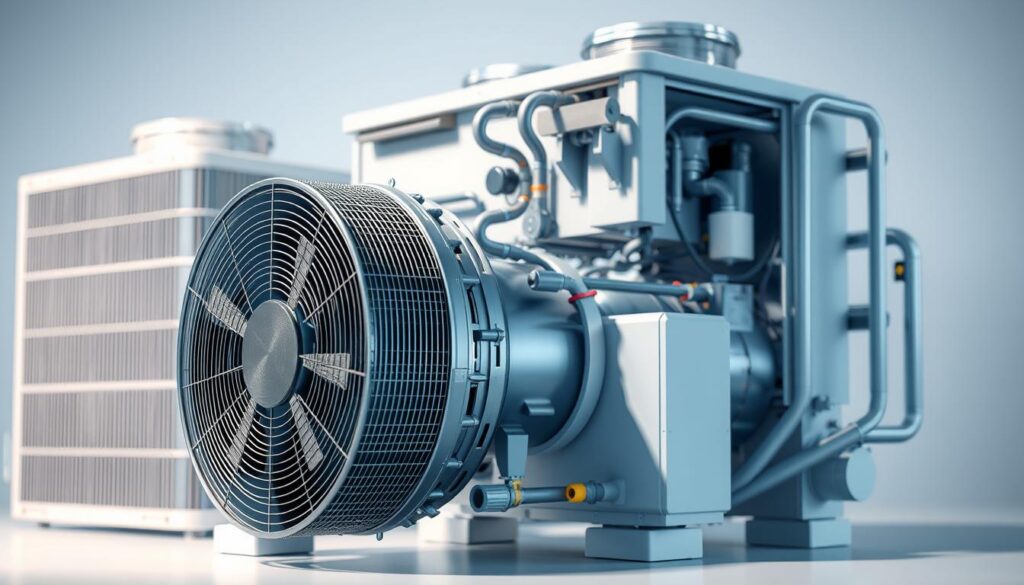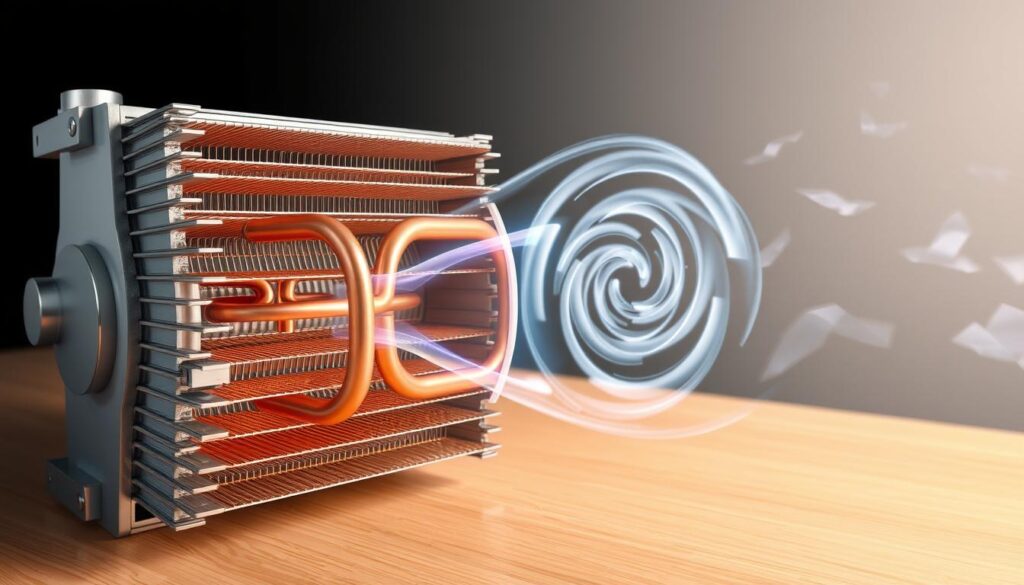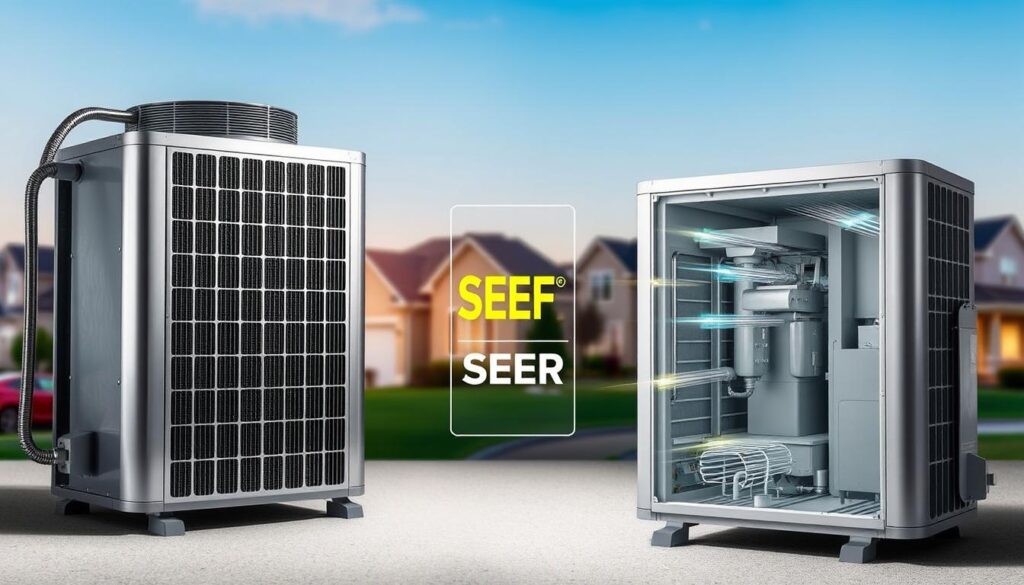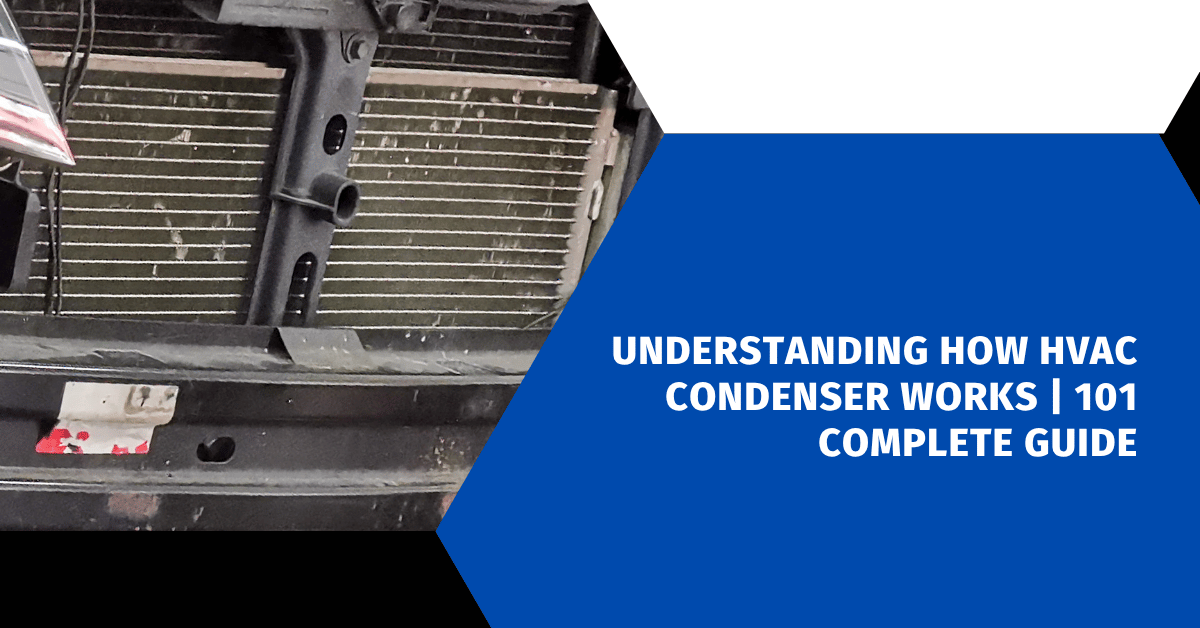Affiliate Disclosure
HVAC Guide Guys is a participant in the Amazon Services LLC Associates Program, an affiliate advertising program designed to provide a means for sites to earn advertising fees by advertising and linking to Amazon.
How HVAC Condenser Works? Ever wondered how your home stays cool on hot summer days? The answer is your HVAC condenser unit. It’s a key part that turns hot air into cool comfort.

Your HVAC condenser unit is the heart of your cooling system. It’s usually found outside your home. This unit is vital for removing heat and keeping your home cool.
When your air conditioning is on, the condenser works hard. It moves heat from inside your home to the outside. This keeps your home at a comfortable temperature.
Modern HVAC condenser units use new refrigeration tech. They have an indoor and outdoor part. This design helps control temperature well and saves energy.
Key Takeaways
- HVAC condenser units are essential for home cooling systems
- Located outside, these units transfer heat from indoor to outdoor spaces
- Modern condensers use advanced refrigeration technology
- Regular maintenance can significantly improve system performance
- Energy-efficient models can reduce utility costs by up to 50%
Table of Contents
What Is an HVAC Condenser Unit and Its Purpose
Your home’s HVAC system has a key part called the air conditioner condenser unit. It’s vital for cooling your home well.
The condenser is the outdoor part of a split air conditioning system. It’s usually on a concrete pad near your house. This box-shaped unit releases heat from inside your home.
Role in Split Air Conditioning Systems
In a split air conditioning system, the condenser works with indoor parts. It helps control temperature and humidity. Its main jobs are:
- Transferring heat from indoor air to the outside environment
- Converting high-pressure refrigerant gas back into a liquid
- Supporting the overall cooling process through precise heat exchange
Basic Functions and Operations
The air conditioner condenser function involves a complex thermal exchange process. Key operational steps include:
- Receiving high-pressure, hot refrigerant gas from the compressor
- Using external fans to cool and condense the refrigerant
- Transforming the gas back into a liquid state
Location Requirements and Installation
Where you place your residential HVAC condenser is key for good performance. Make sure:
- There’s clear space around the unit for airflow
- It’s protected from direct sunlight and extreme weather
- The ground is level for stable installation
“A well-positioned condenser can improve your HVAC system’s efficiency by up to 15%.”
Essential Components of an HVAC Condenser
Your HVAC condenser is a complex system with several critical components working together to keep your home cool. Understanding these parts helps you appreciate the cooling process happening outside your home.
The heart of the HVAC condenser consists of several key elements that ensure efficient heat transfer and cooling performance:
- Compressor: The core component driving the entire cooling process
- HVAC condenser coil: Responsible for heat exchange
- HVAC condenser fan: Critical for heat dissipation
- Refrigerant lines: Enabling refrigerant circulation
- Electrical components: Controlling system operations
Let’s explore each component’s unique role in maintaining your home’s comfort:
“The condenser is like the lungs of your cooling system, expelling heat and ensuring indoor comfort.” – HVAC Engineering Insights
Key Component Breakdown
| Component | Function | Performance Impact |
|---|---|---|
| Compressor | Pressurizes refrigerant | Critical for heat transfer efficiency |
| Condenser Coil | Heat exchange process | Enables thermal energy transfer |
| Condenser Fan | Dissipates heat | Ensures optimal cooling performance |
Each component plays a vital role in your HVAC system’s efficiency. Regular maintenance can help preserve these critical parts and extend your system’s lifespan.
How HVAC Condenser Works: The Complete Process
Understanding how an HVAC condenser works is key to knowing your cooling system. The condenser is essential for changing refrigerant and managing heat. It’s a big part of your air conditioning system.
Heat Absorption Phase
The HVAC condenser’s journey starts with absorbing heat. Warm air enters, and the refrigerant takes in indoor heat. It changes from a low-pressure liquid to a low-pressure gas. This first step is important for cooling your space.
- Refrigerant enters as a low-pressure liquid
- Absorbs heat from indoor air
- Transitions into a low-pressure gas
Compression and Heat Transfer
The compressor is key in the next step. It makes the refrigerant high-pressure and hot. Then, the hot gas releases heat outside.
“The compressor is the heart of the cooling process, transforming refrigerant and enabling heat exchange.”
Refrigerant Flow Cycle
The last step is cooling and condensing the refrigerant. The hot gas cools down in the condenser coils. It turns back into a liquid. This liquid then goes back to the indoor unit to start the cycle again.
- Refrigerant is compressed
- Heat is expelled through condenser coils
- Refrigerant transforms back to liquid
- Cycle repeats continuously
Explore Our HVAC Shop
Looking for top-rated HVAC tools, parts, and accessories? Visit our shop and find the perfect solution for your needs.
Visit the ShopTypes of HVAC Condensers: Air-Cooled vs Water-Cooled
When choosing a commercial HVAC condenser, you’ll find two main cooling methods: air-cooled and water-cooled. Knowing their differences helps you pick the right one for your cooling needs.
Air-Cooled Condensers: Simplicity and Accessibility
Air-cooled condensers are popular for homes and small businesses. They use the air around them to cool the refrigerant. This makes them easy to set up and keep running.
- Ideal for smaller spaces and residential settings
- Lower initial installation costs
- Simpler maintenance requirements
- Typically have a 5-year operational lifespan
Water-Cooled Condensers: Efficiency and Performance
Water-cooled condensers are best for big commercial places. They cool down using water, which is more efficient than air.
- Higher energy efficiency
- Better temperature and humidity control
- Preferred in high-rise commercial buildings
- More consistent cooling performance
“The choice between air-cooled and water-cooled condensers depends on your specific cooling requirements and environmental constraints.”
Comparative Analysis
Choosing a commercial HVAC condenser involves looking at several factors. Consider the installation site, energy use, upkeep, and long-term costs.
| Feature | Air-Cooled | Water-Cooled |
|---|---|---|
| Initial Cost | Lower | Higher |
| Energy Efficiency | Moderate | High |
| Maintenance Complexity | Simple | Complex |
| Best Suited For | Residential/Small Commercial | Large Commercial Spaces |
Modern HVAC technology keeps getting better, aiming for more eco-friendly and efficient cooling for commercial areas.
Explore Our HVAC Shop
Looking for top-rated HVAC tools, parts, and accessories? Visit our shop and find the perfect solution for your needs.
Visit the ShopThe Role of the Compressor in Condenser Operation
Your HVAC condenser unit relies on the compressor as its most critical component. Think of the compressor as the heart of your air conditioning system. It pumps refrigerant and enables critical heat transfer processes.
The compressor plays a key role in managing refrigerant pressure and facilitating condenser heat transfer. Understanding its functionality can help you appreciate the complexity of your cooling system.
Compression Cycle Mechanics
During the compression cycle, the compressor performs several essential functions:
- Pressurizes refrigerant from a low-pressure gas to a high-pressure gas
- Increases refrigerant temperature through mechanical compression
- Prepares refrigerant for heat exchange in the condenser coils
Pressure Management Strategy
Effective pressure management is key for optimal hvac condenser unit performance. The compressor carefully controls refrigerant pressure. This ensures efficient heat transfer and system reliability.
| Compressor Performance Metric | Typical Value |
|---|---|
| Average Lifespan | 10-15 years |
| Replacement Cost | $900-$2,900 |
| Maintenance Impact | Can extend life up to 15 years |
Performance Factors
Several key factors influence compressor effectiveness:
- Refrigerant charge
- Electrical supply stability
- Mechanical condition
- Regular maintenance
“The compressor is the powerhouse that drives your air conditioning system’s cooling capabilities.”
By understanding these dynamics, you can better maintain your HVAC system. This helps prevent performance issues.
Understanding Condenser Coils and Heat Exchange

Your HVAC system’s condenser coil is key to keeping your home cool. It takes heat from inside and moves it outside.
HVAC condenser coils are made from copper and aluminum. Each has its own benefits for cooling:
- Copper coils conduct heat well
- Aluminum coils are light and don’t rust
- Hybrid coils mix both for best results
The coil’s efficiency affects your cooling system’s performance. Larger coils can boost cooling and SEER2 ratings.
“A well-maintained condenser coil is key to efficient heat exchange and lower energy costs.”
Keeping your coil clean is important. Dirt can block airflow and lower cooling. Experts say clean them yearly for best results.
Learning about heat transfer in your condenser coil helps you understand your cooling system. It also helps you make smart maintenance choices.
Explore Our HVAC Shop
Looking for top-rated HVAC tools, parts, and accessories? Visit our shop and find the perfect solution for your needs.
Visit the ShopThe Importance of Proper Condenser Installation
Installing a residential HVAC condenser needs skill and care. Your air conditioning system’s performance depends a lot on the condenser unit’s placement and upkeep. A good installation can mean the difference between a cool system and one that can’t keep up.
Placement Considerations for Maximum Efficiency
Choosing the right spot for your HVAC condenser is key. Look for a place that meets several important criteria:
- Select a level surface away from direct sunlight
- Ensure good air circulation around the unit
- Protect the condenser from debris and vegetation
- Avoid areas with high moisture or water accumulation
Clearance Requirements for Optimal Performance
Having the right space around your HVAC condenser is vital for its efficiency. Experts say you need specific distances to keep air flowing well and the system running smoothly.
| Clearance Direction | Recommended Distance |
|---|---|
| Top of Unit | 24-36 inches |
| Sides of Unit | 12-24 inches |
| Front of Unit | 36-48 inches |
Benefits of Professional Installation
Choosing professional installation for your HVAC condenser has many benefits:
- Ensures correct refrigerant charge
- Guarantees proper electrical connections
- Adheres to local building codes
- Maximizes system efficiency and longevity
“A well-installed HVAC condenser can potentially reduce energy usage by 10-30% and extend the system’s lifespan by up to 10 years.” – HVAC Installation Experts
Professional installation is an investment that pays off. It improves performance, saves energy, and cuts down on repair costs for your HVAC condenser.
Maintenance Requirements for HVAC Condensers
Keeping your HVAC condenser unit in good shape is key for its performance and life. Regular care boosts efficiency and avoids expensive repairs.
“Proper maintenance is the key to extending the life of your HVAC condenser unit and keeping energy costs low.”
Here are the essential maintenance tasks for a smooth-running HVAC condenser unit:
- Clean condenser coils every 3-6 months to remove dirt and debris
- Check and replace air filters every 1-2 months
- Inspect electrical connections for signs of wear
- Monitor refrigerant levels annually
- Clear surrounding area of vegetation and obstructions
Did you know regular maintenance can boost system efficiency by up to 15%? Ignoring your HVAC condenser unit can cause big problems:
- Increased energy consumption by 20-30%
- Reduced cooling performance
- Potential system failures
- Shortened equipment lifespan
It’s wise to get professional maintenance at least once a year. A skilled technician can:
- Identify and fix refrigerant leaks
- Check and clean internal parts
- Ensure the system works at its best
- Prevent sudden breakdowns
Homeowners can do some basic maintenance themselves. Keep the area around the unit clear and check for damage. Remember, a well-maintained condenser unit can last 10-15 years with proper care.
Explore Our HVAC Shop
Looking for top-rated HVAC tools, parts, and accessories? Visit our shop and find the perfect solution for your needs.
Visit the ShopEnergy Efficiency and SEER Ratings
Knowing how efficient your HVAC condenser is key to saving on cooling costs over time. SEER (Seasonal Energy Efficiency Ratio) ratings are important for checking how well air conditioning systems work.

Understanding SEER Values
SEER ratings show how much cooling an air conditioner gives compared to how much energy it uses. The higher the SEER rating, the better the efficiency of your HVAC system. Today, there are rules for energy standards:
- Minimum SEER rating of 13 in northern states
- Minimum SEER rating of 14 in southern states
- Most modern units range from 13 to 21 SEER
Efficiency Optimization Tips
Here are ways to make your HVAC system more efficient:
- Choose units with SEER ratings between 15-18
- Consider variable-speed compressors
- Maintain regular system maintenance
Cost-Saving Benefits
Getting a high-efficiency system can save you a lot of money:
| SEER Rating | Potential Energy Savings | Initial Cost Upgrade |
|---|---|---|
| 14 to 16 SEER | Up to 15% reduction | $900 – $1,500 |
| 16 to 21 SEER | Up to 30% reduction | $3,000 – $5,000 |
*Upgrade wisely: Higher SEER ratings can significantly reduce your carbon footprint and energy expenses.*
Common Problems and Troubleshooting
Understanding how HVAC condenser works means knowing common issues. These problems can affect your system’s performance. Homeowners often face issues that can lower efficiency and shorten lifespan.
“Regular maintenance is the key to preventing 50% of major HVAC system problems,” experts recommend.
Let’s look at the usual problems with HVAC condensers:
- Airflow Restrictions: About 80% of HVAC failures are due to blocked airflow
- Dirty condenser coils can cut efficiency by up to 30%
- Bent fins block air flow
- Fan motor and blade problems
- Refrigerant leaks harm performance
When figuring out HVAC condenser issues, watch for these warning signs:
| Problem | Potential Impact | Recommended Action |
|---|---|---|
| Refrigerant Leaks | 20-30% Efficiency Loss | Professional Inspection |
| Dirty Coils | Reduced Heat Transfer | Annual Cleaning |
| Fan Issues | 25% Malfunction Rate | Motor/Blade Check |
Most issues can be avoided with regular maintenance. While some small problems can be fixed yourself, bigger ones need a pro.
Regular upkeep is the best way to keep your system running well. It can also cut down on repairs and make your system last longer.
Explore Our HVAC Shop
Looking for top-rated HVAC tools, parts, and accessories? Visit our shop and find the perfect solution for your needs.
Visit the ShopWhen to Replace Your HVAC Condenser
Knowing when to replace your HVAC condenser unit can save you money and prevent unexpected system failures. An air conditioning system is a big investment. Understanding when to replace it is key for keeping your home comfortable and energy-efficient.
Signs of Condenser Failure
Several key indicators suggest your HVAC condenser unit might need replacement:
- Frequent system breakdowns
- Reduced cooling performance
- Unusually high energy bills
- Age of the unit over 10 years
- Persistent refrigerant leaks
Replacement Considerations
When deciding if you should replace your hvac condenser unit, consider these important factors:
- Cost of ongoing repairs versus replacement
- Current system efficiency
- Potential energy savings with a new unit
- Compatibility with existing HVAC infrastructure
Cost Factors
The decision to replace your HVAC condenser unit involves several financial considerations:
| Replacement Factor | Cost Impact |
|---|---|
| Unit Size | Directly affects installation price |
| SEER Rating | Higher efficiency means higher upfront cost |
| Installation Complexity | Can increase total replacement expense |
“For every $1 spent on preventative maintenance, $4 can be saved in repair and replacement costs.” – US Environmental Protection Agency
If your hvac condenser unit is over ten years old or repair costs are near 50% of a new unit’s price, replacement is often the best choice. Talking to a professional HVAC technician can give you advice that fits your system and home needs.
Conclusion
Knowing how HVAC condensers work is key to a comfy home. The air conditioner’s condenser is vital for cooling efficiency. Learning about heat transfer and refrigerant cycling helps you choose the right cooling system.
Regular maintenance is essential for your system’s health. Air-cooled condensers in homes need regular care. Experts like Wolfer’s Home Services suggest cleaning coils and checking refrigerant levels to keep things running smoothly.
Energy efficiency is at the heart of good HVAC performance. The right condenser can cut down your energy bills. Professional help ensures you get a system that fits your climate and home needs, saving you money in the long run.
Investing in HVAC knowledge helps you make better choices for your home’s cooling. Whether upgrading or improving your current setup, knowing about HVAC condensers is your best ally for a cool, efficient home.

